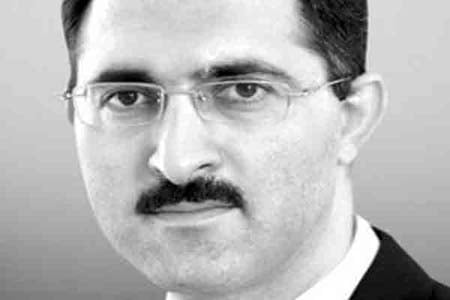Turkish PM Erdoğan’s imagined enemies

Date posted: December 20, 2013
ABDULLAH BOZKURT
The political fallout from dirty deals apparently run by a band of brothers in graft in the Turkish Cabinet will not only damage the ruling Justice and Development Party (AK Party) but it will also leave a weak spot in Turkey’s defenses when it comes to penetration by clandestine Iranian activities in Turkey. If this massive corruption investigation, perhaps the biggest in the history of our republic, is only the tip of the iceberg as some seem to have suggested, then the national security of Turkey is very much at risk of being compromised.
The mere fact that these ministers, these three musketeers of government, may have joined forces to help an Iranian national named Reza Zarrab do his own dirty bidding both in Turkey and abroad (China, Ghana, United Arab Emirates and Italy were mentioned in the files) using government powers and privileges exposes how Turkey has become vulnerable to Iranian plots.
In a futile attempt, Prime Minister Recep Tayyip Erdoğan is mounting an offense to defend his government by highlighting so-called foreign enemies of Turkey, an implicit reference to the US, the EU, Israel and the Jewish lobby abroad and domestic conspirators at home, which includes diverse groups from Alevis and faith-based conservative groups like the Hizmet (Gülen) movement to business interest groups and unions. These usual suspects and imaginary enemies of Turkey serve as scapegoats in Erdoğan’s strategy to ride out the stormy revelations of the corruption scandal. He did so during the May-June Gezi Park protests as well.
The problem with this fallacy, however, is that there is no evidence to back these preposterous claims, while there is a body of overwhelming evidence, all gathered through a court-sanctioned judicial investigation and corruption dragnet run by the İstanbul Prosecutors’ Office, indicating that Erdoğan’s men are in it up to their necks. It is clear that Erdoğan has pushed the panic button to cover up the shady deals his government people have been involved in. The summary dismissal of police chiefs not only in İstanbul, where the prosecutors discovered this major corruption scheme, but also in other parts of the country, tells the tale of great worry on the part of Erdoğan that similar scandalous details may emerge elsewhere in the country as well. It seems he does not even trust police chiefs he personally appointed a few years back.
What will the ramifications of this damaging exposé be? Well, for one, the AKP has lost the source of its primary appeal, representing corruption-free government. The ministers involved in the scheme have done a great disservice to their fellow Cabinet members and the ruling party by inflicting irreparable damage on the reputation of their fight against corruption. This will cast a long shadow on the party for some time to come and will continue to haunt each and every member of the party in political debates. Erdoğan’s defensive posture only further reinforces this image. Instead of demanding disclosure and that the heads of those responsible must roll, he has tightened his grip on the ongoing investigation, shooting himself in the foot.
…
Can Erdoğan contain the damage by derailing the investigation? Perhaps, but only to a limited degree. It is true that he controls the police and Interior Ministry (as opposed to a common misperception abroad that Muslim scholar Fethullah Gülen has a huge influence on Turkish security services). He can sack chiefs and appoint new ones, as he has done recently. After the story of corruption scandal broke, he even brought in a former governor who has no background in police work to lead the İstanbul office, just to make sure nothing escapes his scrutiny as the probe escalates further. As for the judiciary, he can’t roam freely, thanks to the 2010 reforms that brought a more or less pluralistic and democratic structure to Turkey’s judicial council that sits at the heart of the Turkish justice system. Erdoğan has some leverage using the position of the justice minister on the council, but not to the extent that he enjoys in the police department. Therefore, the Turkish judiciary, by and large, remains independent and impartial.
The main problem is the lack of judicial police in Turkey. Since prosecutors and judges do not have a separate and independent police force to run investigations, search for evidence and round up suspects, they have to rely on the Turkish security services. Although prosecutors can instruct the police to maintain secrecy while conducting the probe and prohibit them from sharing their findings with their superiors (which was the case in the initial stages of the investigation involving the interior minister, who oversees the Turkish police), there is no guarantee that government officials and politicians from the ruling party will not be tipped off on ongoing probes by prosecutors. In fact, according to local media, Interior Minister Muammer Güler, who allegedly took bribes from Zarrab, removed a police chief who reported the Iranian national’s money laundering scheme to the watchdog agency, the Financial Crimes Investigation Board (MASAK). The minister also apparently told Zarrab that he was under surveillance, prompting the Iranian national to plan an unsuccessful flight from the country.
I think the Erdoğan government is contemplating another strategy to weather this corruption crisis that has hit home and people very close to him. He has full control of Turkey’s National Intelligence Organization (MİT) through his confidant, Hakan Fidan, who leads the spy agency. Since Law No. 2937 on State Intelligence Services and the National Intelligence Organization gives MİT the right to run investigations related to spy charges rather than the police or the gendarmerie, we may very well see a series of fictitious cases launched by government to go after people who, in fact, exposed government dirty laundry. The criminal complaint filed by the Office of the Prime Minister against the liberal Taraf newspaper and investigative reporter Mehmet Baransu for publishing confidential documents that unveiled massive profiling of unsuspecting, innocent citizens in violation of their constitutional right to privacy is an example of that strategy.
Erdoğan’s remarks on Wednesday pointing to a gang within the state and that his government is keen to expose this gang were part of the campaign to build a case on that logical fallacy as well. Faced with an embarrassing corruption scheme, he will likely try to invoke secret intelligence prerogatives based on treachery in a bid to establish a defense line while trying to sway the Turkish public to his side against imaginary impending threats to national security. Erdoğan hopes this strategy will confuse the Turkish people, allow him to consolidate his ranks and mobilize his own troops in a nation ready to buy into conspiracy theories. Pro-government media will support and promote this campaign, as well. Will it work? Not really. The powerful generals who abused state security courts to instill that kind of fear in Turks failed in the ’80s and ’90s and the Erdoğan government’s use of the same strategy will backfire as well.
What is more, Turkey is no longer the old Turkey. The affluent middle class, the young population and stronger civil society organizations, strengthened by the digital revolution with such tools as social media and Internet portals, will resist any attempts to turn the clock backwards on the development of Turkish democracy. People will simply ask why Prime Minister Erdoğan is not going after his people who have been sleeping with the enemy next door if he is really sincere in addressing external threats to this great nation.
Source: Today's Zaman , December 20, 2013
Tags: Fethullah Gulen | Freedoms | Hizmet and politics | Turkey |
























